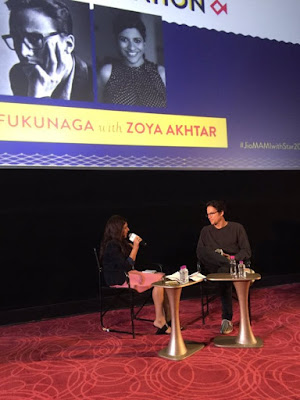I look at cinema from the immortality perspective: Cary Fukunaga
 |
| Zoya Akhtar interrogates American film director Cary Fukunaga at the 18th Jio MAMI Mumbai Film Fest |
Referring to Cary Fukunaga as the ‘Beast of every
nation’, Bollywood’s very own filmmaker Zoya Akhtar welcomed the acclaimed
American film director, writer and cinematographer for a tête-à-tête as a part of the ‘In Conversation’
series at the Jio MAMI Mumbai Film Festival with Star.
Playing on Cary’s 2015 war drama film’s title Beasts of No Nation, Zoya kickstarted
the conversation by highlighting the American filmmaker’s trademark style of
showcasing stories from a different culture and country with every film. “There
is no pressure to be a nomadic storyteller. It’s just a natural desire. Since I
was little, I was always interested in history and would drive my family crazy with
questions. Nobody answered my questions but in the attempt to get answers, I
grew to learn a lot about the injustices in the world. At the core, each of my
films is a human story and human stories are universal. Although the most
interesting part for me is indeed the research on cultural differences and the
learning of new cultures,” Cary said.
The diversity in his films not just extends to
countries, but also genres. While his Beasts....
deals with children and warfare set in Ghana, his debut feature film Sin Nombre was an adventure thriller
from Mexico – a story on immigration and gang life. After these, he adapted the
classic novel Jane Eyre, which was shot in England, followed by his
much applauded television anthology crime drama True Detective. Telecasted on HBO, this series made Cary a
household name, winning him a Primetime Emmy Award for Outstanding Directing for
a Drama Series.
Talking about their respective individual styles of
filmmaking, Zoya and Cary went on to discuss about their approach to directing
films not written by them. While Zoya pointed out that she has never directed a
film not written by her, she urged Cary to speak about his experience of
directing someone else’s script and also adapting a novel into a screenplay. “Directing
someone else’s work has been more difficult for me. You feel like a
psychoanalyst, interpreting the writer’s mind,” he revealed.
“Give us one hot tip on adapting a novel into a
screenplay,” Zoya asked Cary, adding, “although I haven’t done it, my attempt
perhaps would be to retain the core and essence of the story.” To which Cary
replied, “The most important thing is that you should like the novel. There
should be something that moves you and you transfer your internal emotions to
the story. That becomes your screenplay. Most adaptations of novels often fail
because one cannot reduce things to the length of a feature film.”
“Do you think cinema can add consciousness to
society, or even make a dent?” pat came another question from Zoya as she
observed how Cary’s seven year old film Sin
Nombre, a disturbing story on the plight of immigrants, is relevant even today. “It’s
sad that Sin Nombre is relevant till
date but I look at cinema more from the immortality perspective. It’s dangerous
for a filmmaker to think that his film is going to bring about a change in
society,” Cary noted. Having said that, his Beasts
of No Nation did change lives of some of the child actors for the better.
“The African child who plays Strika in the film used to sleep on a garbage pile
before we got him on board. Today, he goes to school and has a proper place to
stay,” informs the filmmaker, who often ropes in non-actors from the region
where he is shooting a particular film.
The conversation between Zoya and Cary was peppered
with clips from Cary’s films along with a clip from his TV series True Detective. Amidst intense discussions
on the technicalities of filmmaking and the “parade of problems” encountered
while making films, Cary kept it light throughout with a great sense of wit.
When asked by Zoya about the one genre he would never want to dabble in, he
quipped, “I will produce porn but I won’t be on the sets (laughs),” adding,
“Reality TV is the least fascinating for me.”
He also confessed that he often
cries while watching movies on the plane. On watching Indian films, he joked,
“I did watch Sultan on the way here. The film is my personal journey.”

Comments